At the BNP Paribas Open in Indian Wells, Calif., maybe the most prestigious nonmajor tournament on the global tennis tour, players conduct their warm-up routines on a patch of grass outside the stadium. Some toss medicine balls to their trainers, while others stretch with elastic bands. A few pedal lightly on upright bikes. One player throws a Frisbee.
Then Coco Gauff takes the field.
Gauff, who in September became the first American teenager to win the U.S. Open in nearly a quarter-century, grabs a football, sends a guy downfield, and uncoils a tight, 40-yard spiral, right into the receiver’s chest. Then she does it again. And again.
Gauff’s cannon is a flex. I see your toe-tapping a soccer ball and raise you a Patrick Mahomes bomb. Gauff, who grew up in the football hotbed of South Florida, takes tremendous pride in showing off her athleticism. “It’s not really for the girls,” Gauff tells TIME in early March, about a week before her 20th birthday. “I don’t think they care too much, especially the Europeans. They don’t know much about football.” Her throws are designed to mess with the men. “I do like to show, especially the American guys, that I can probably throw it just as far as them, if not farther,” says Gauff. “I love to get in the American guys’ heads.”
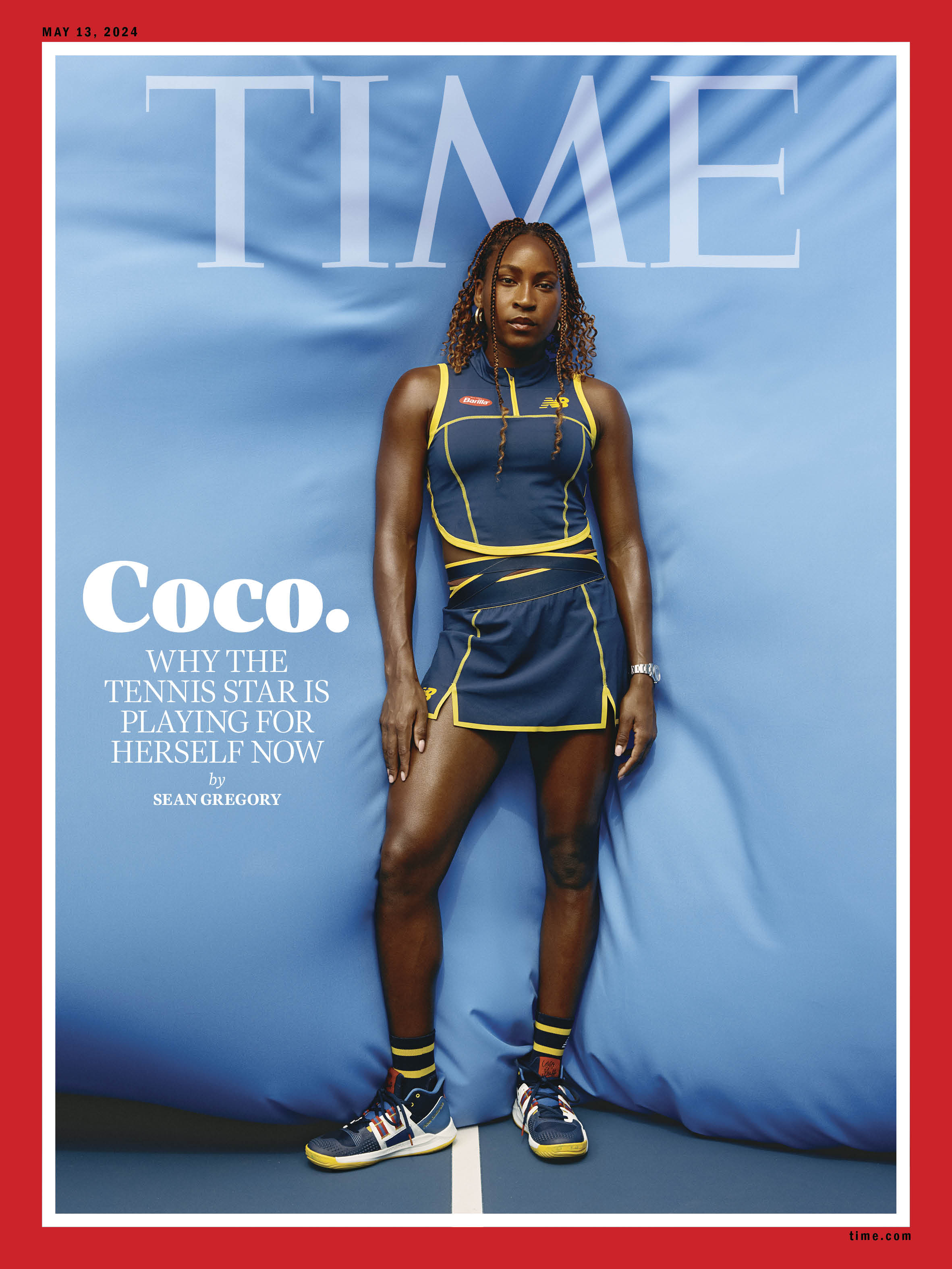
To her coach, former tour player and current ESPN commentator Brad Gilbert, Gauff’s live arm speaks to her still untapped potential. “When you see that, it’s almost like ‘Sh-t, she should be serving better,’” he says.
That’s quite a statement, considering that Gauff’s 125-m.p.h. delivery to Aryna Sabalenka at this year’s Australian Open was the fastest female serve in the tournament. That her game might just be scratching the surface of its greatness speaks to Gauff’s status as America’s potential next iconic, mononymous athlete. From Tiger to Serena to LeBron to … Coco?
Fans have forged a unique connection with Gauff, a function of both her achievements at a young age and her willingness to be vocal about sociopolitical issues. She struggled to meet early expectations on the court, fighting self-imposed pressures for years, but she finally eased her mind a bit last summer, thrilling the crowd in New York City as she nabbed her first Grand Slam win at the U.S. Open. Throughout the tournament, Gauff charmed her growing fan base. She supported the rights of climate protesters to disrupt her semifinal match. She mused on her anime infatuation, and, in her victory speech, she spontaneously thanked her online detractors for “adding gas” to her fire.
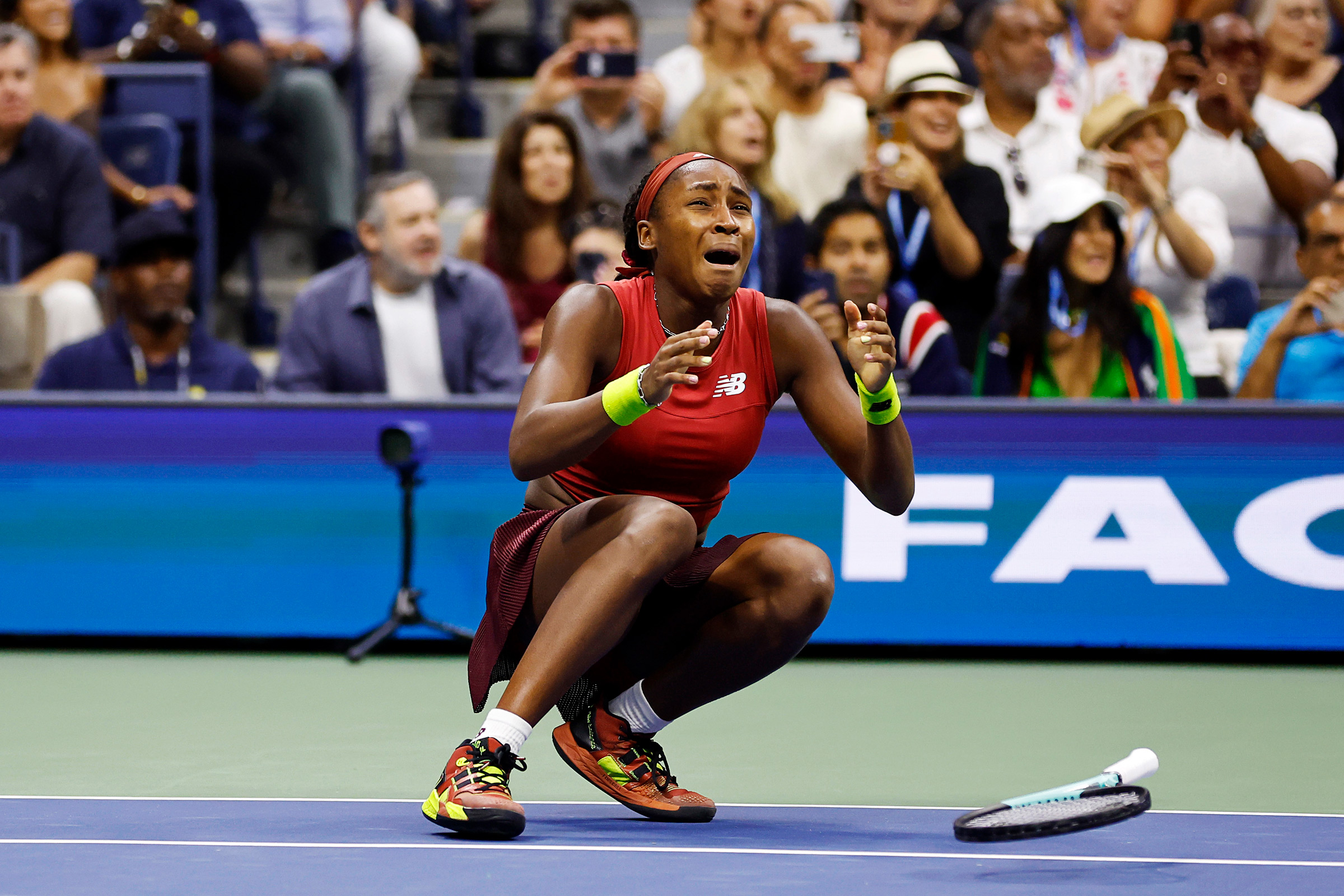
When Naomi Osaka withdrew from the 2021 French Open to tend to her mental health, Gauff was the first tennis player to message her with support. Late last year, when 18-time major champion Chris Evert revealed that her ovarian cancer had returned, Gauff was one of the few active players to reach out to her. “When people see an athlete with her level of fame and fortune having humility and empathy for people around her and awareness of world events, it sends a clear message,” Evert tells TIME. “She’s focused. She’s fearless. We need some leaders in the women’s game. She definitely will be one of them. If not the one.”
Read More: Coco Gauff Is Chasing That Championship High
Gauff earned nearly $23 million in winnings and endorsements in 2023, making her the highest-paid female athlete in the world, according to Sportico, a sports-business publication. She has a momentous spring and summer ahead—the French Open starting May 26, then Wimbledon, then the Olympics, then her U.S. Open title defense beginning in August. “I always knew I wanted to try to win multiple Grand Slams,” says Gauff as an SUV rolls along I-10, en route from Indian Wells to L.A. for TIME’s Women of the Year gala. “Sometimes people get unmotivated after winning one. That hasn’t been a personal challenge for me.”
Gauff usually arrives ahead of schedule. She won a major while still in her teens, upset Venus Williams in the first round of Wimbledon at 15, and started walking at 9 months, skipping the crawling stage. When she was 3, she got out of her stroller and tried to catch up to her older cousins who were running around a track. She was too small to pass them. But she also refused to tire out. Her mother Candi, a former track-and-field star at Florida State, could spot athletic excellence. “That was the first inkling of like, ‘This is not normal,’” says Candi.
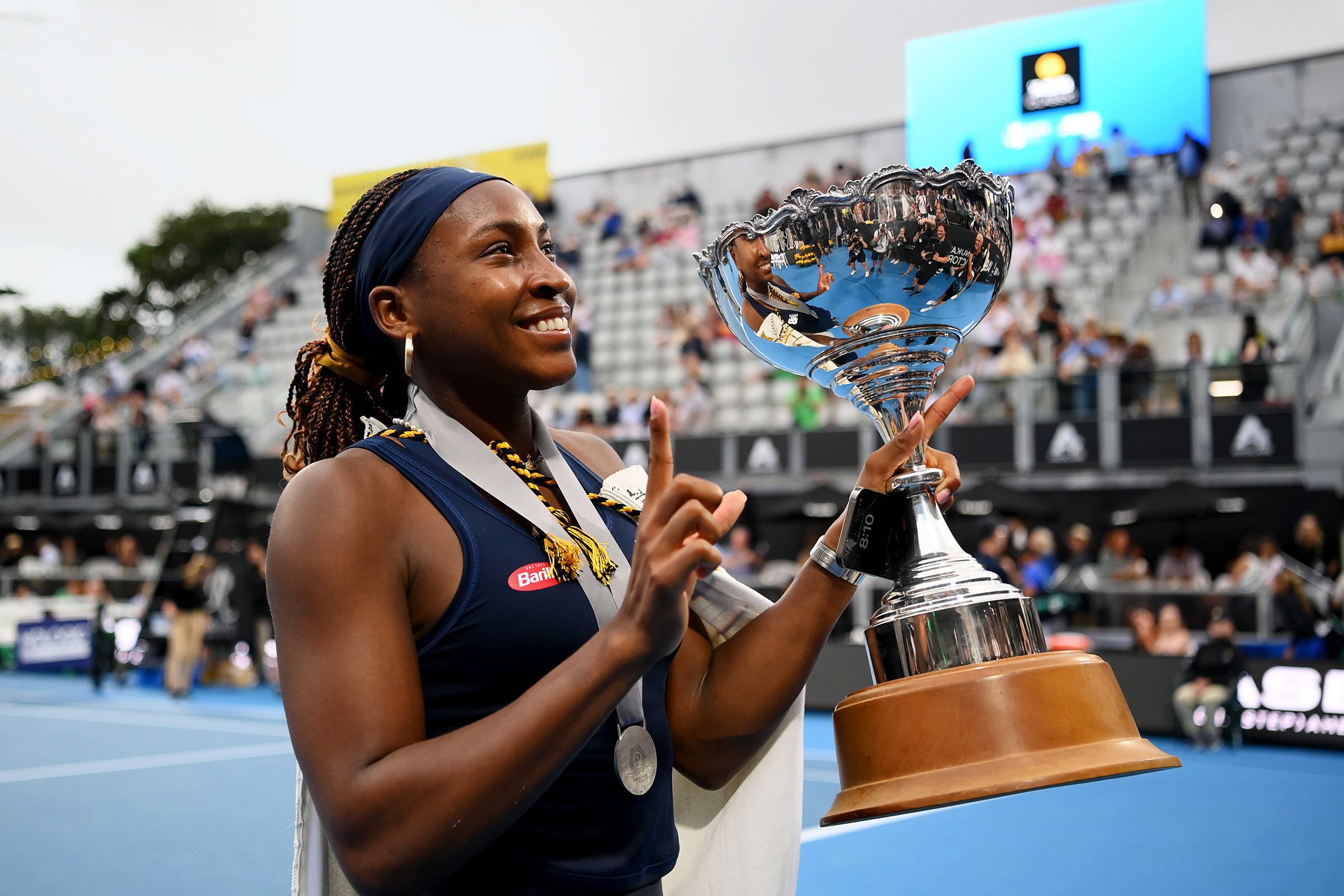
Before Coco turned 6, she and her dad Corey were watching Serena Williams win the Australian Open. Corey, a former college basketball player, called Williams the GOAT. “What’s a GOAT?” Coco asked. Greatest of All Time, he replied. “I want to be a GOAT,” she said. He bought her a pink Wilson racquet, and she spent hours hitting against her garage in Atlanta. The example of the Williams sisters drove her. “As a little girl, it was very important to see representation and see myself in players, especially in the field where it is predominantly white,” says Gauff. “I don’t think I would have had the belief I could do it if it wasn’t for them.”
Read More: TIME 100 Next: Coco Gauff, by Billie Jean King
When Gauff was 8, the family relocated to Delray Beach, Fla.—where Candi and Corey grew up—to be closer to expert tennis training. She’d be homeschooled, giving her more time to work on her game. She spent a few weeks a year in France at the academy run by Patrick Mouratoglou, Serena Williams’ coach from 2012 to 2022. At 10, she told Mouratoglou she wanted to win more Grand Slams than anybody. “She was crazy ambitious,” he says. “She was looking me in the eyes and was really sure about what she was saying.”
Life on the road could be isolating for a tween. Gauff missed going to school and hanging out with friends. When she was 12, at a tournament in France, she says, a group of Croatian boys threw orange peels at her and called her a monkey. She cried that night. “Then I just kind of got over it the next day,” says Gauff. “I just felt like that’s just something that people experience, which is not a great thing. They just probably didn’t grow up around other people that looked different. I don’t have any anger towards it. It was not an experience that defined me.”
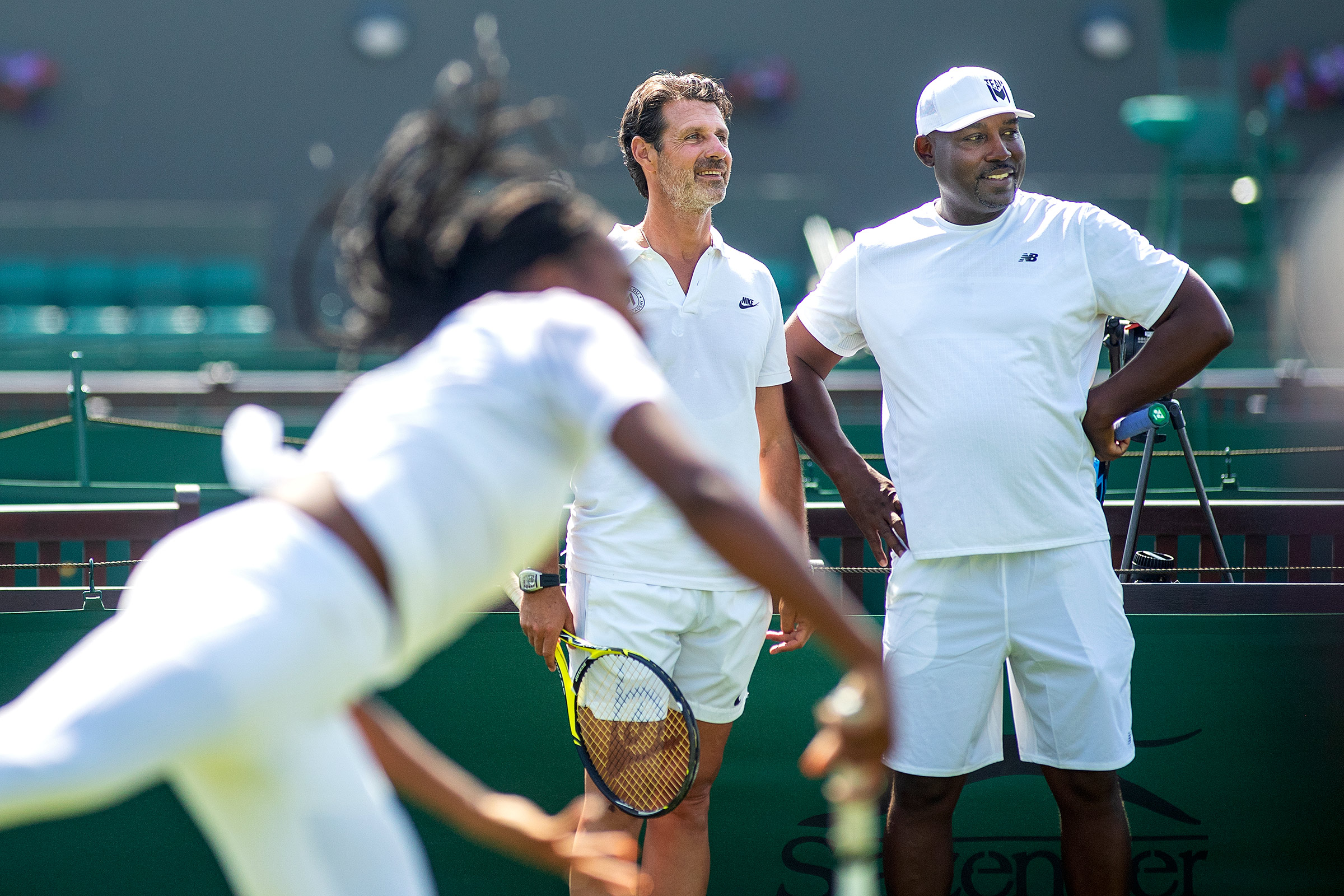
In December 2018, at 14, Gauff became the youngest player in 15 years to win the prestigious Orange Bowl under-18 singles championship. Just a few months later, however, she got rolled, 6-1, 6-1, in a qualifying round of a low-level pro tournament in Bonita Springs, Fla. She complained about the scouting report. “She was making all kinds of excuses,” says Candi, who gave her daughter the option to step away and enroll in a brick-and-mortar high school if she wasn’t going to at least try. A mere two months later, Gauff was getting social media shout-outs from Michelle Obama, Snoop Dogg, and Magic Johnson for becoming the youngest woman to reach Wimbledon’s fourth round in almost three decades. That August, Obama met with Gauff’s family in her Washington, D.C., office for nearly an hour. Her main piece of advice: When the demands of fame overwhelm you, it’s OK to say no. That fall, Gauff attended a homecoming dance in Boca Raton, Fla., for a glimpse of normal adolescent life. She and her best friend danced together for 15 minutes or so, then spent most of the night sitting in the bleachers, waiting for a ride home. “I just think I was at a maturity level different from the kids around me,” says Gauff. “No one has their life figured out at 15. But I, for the most part, did.”
In June 2020, during the global sports shutdown and following the murder of George Floyd, Gauff stepped before a crowd in Delray Beach. “If you are choosing silence,” she said, “you are choosing the side of the oppressor.” Gauff’s parents weren’t certain that at such a young age she should wade into the charged issue of police brutality. But the prior speaker at the -protest—Gauff’s grandmother Yvonne Lee Odom, the first Black student to attend an all-white high school in Delray Beach, effectively ending segregation in the area’s public schools—served as inspiration. “If she can do that with such grace, I can do my part,” says Gauff now.
When tennis restarted later that summer, Gauff lost in the first round of the U.S. Open and the second round of the French. “I was trying to live up to what other people wanted for me,” she says. Pundits began knocking her forehand as unsound. “That got in my head a little bit,” she says. She reached her first major championship final in 2022, at Roland Garros, where she faced world No. 1 Iga Swiatek. “I had a lot of anxiety attacks before that final,” says Gauff. “It felt like life or death. It felt hard to breathe.” After losing the first set, she went to the bathroom and cried. “I lost that match before I stepped on the court,” she says.
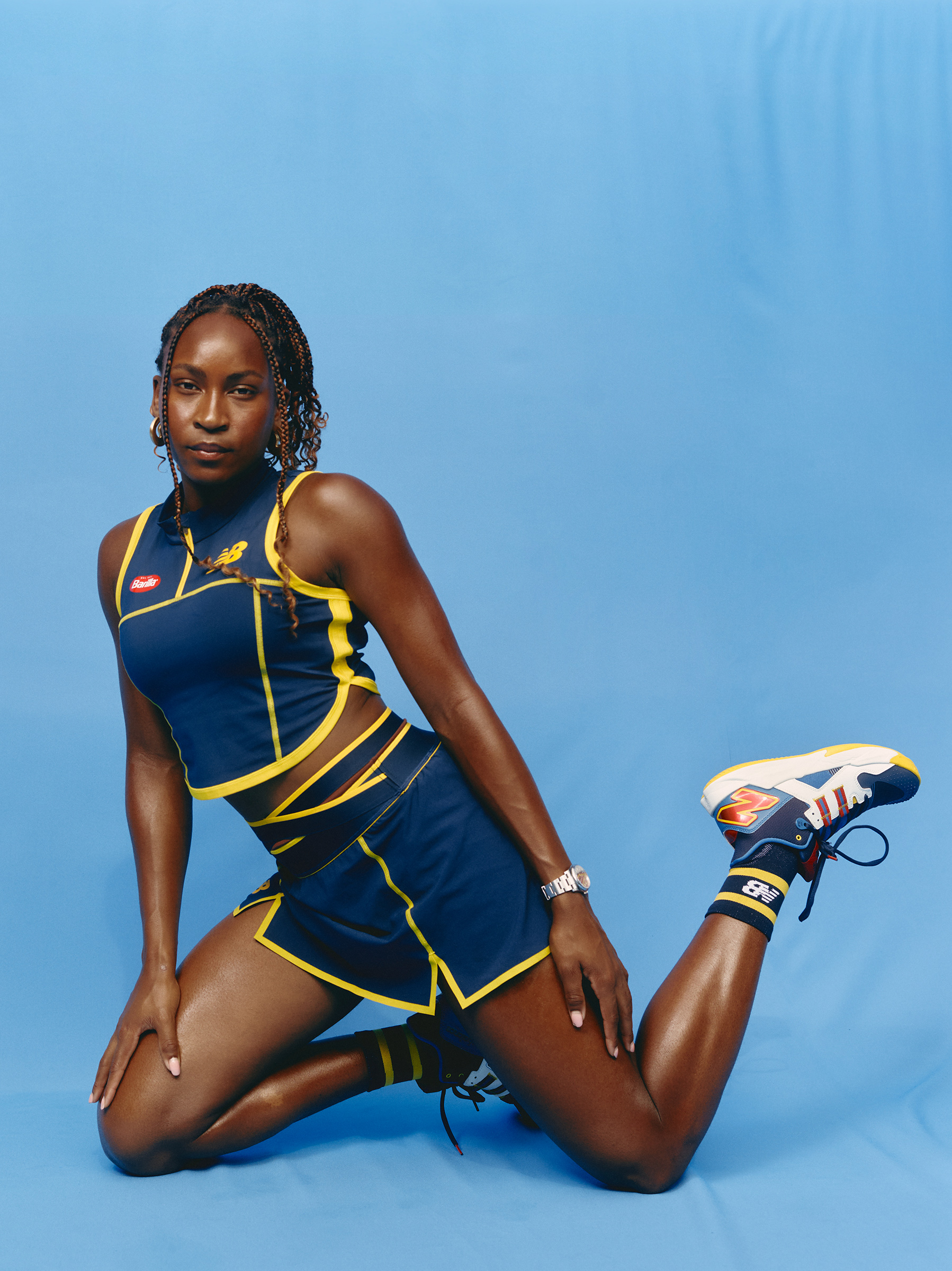
Last year, another early exit—at Wimbledon, in the first round—almost sent Gauff spiraling. The day after the loss, she refused to leave her room. Her parents invited her out for dinner and a show. Instead, she ordered Uber Eats and watched Judge Judy. “I was in a really dark place,” says Gauff. “I put my identity too much into tennis. It was taxing to feel awful all the time.”
She made a conscious effort to adjust her mindset. “It is much easier to play for yourself than it is for other people,” says Gauff. “I realized it’s impossible to satisfy everyone.” She made other key changes too, like teaming up with Gilbert, who coached Andre Agassi to six major championships and an Olympic gold medal, and having Corey sit in a different spot to watch her matches. “My dad, he doesn’t give the best reactions in the box,” says Gauff. “He’s a very emotional person.” She mimics his familiar “frustrated dad in stands” histrionics: arms flailing, foot stomping. “Sometimes when I lose a point, the first thing I look at is the box,” says Gauff. “And there’s something more reassuring seeing somebody clapping.” Corey didn’t sit in her box during tournaments in Washington, D.C., and Cincinnati, and Gauff won both events. He watched the U.S. Open matches in a suite, or in the case of the final, on a TV in an empty fitness room in Arthur Ashe Stadium, where he could scream, pout, and pray to his heart’s content.
Gauff lost the first set, just like in Paris the previous year. She again retreated to the bathroom. But this time she didn’t shed any tears. She looked in the mirror, splashed water on her face, and brimmed with confidence. “I feel like I won the match before I even stepped on the court,” she says.
Unburdened from suffocating expectations, Gauff devotes her attention in Southern California to a favorite off-court pastime: giving proper guff to the middle-aged men in her life. On the ride back to Indian Wells after the Women of the Year event, Gauff laughs out loud watching her father wiggle around in his seat. As he whines about his comfort level, she is utterly gleeful. Before another morning practice session, her conversation with Gilbert—a man fond of sharing his step count, weight-lifting routine, and history with Agassi—somehow turns to the Magic Mike movies. “Brad, do you know how to strip?” she asks him. Gilbert, 62, seems unsure how to respond. “You didn’t say no.” Later, Gilbert mimes volleying a ball and shuffling his feet toward the service line, as if Gauff should copy him. “A little bit faster than that, though, right?” Gauff says. “That’s how you backpedal? You look like you’re going to park the car. It’s a technique. The hunchback.”
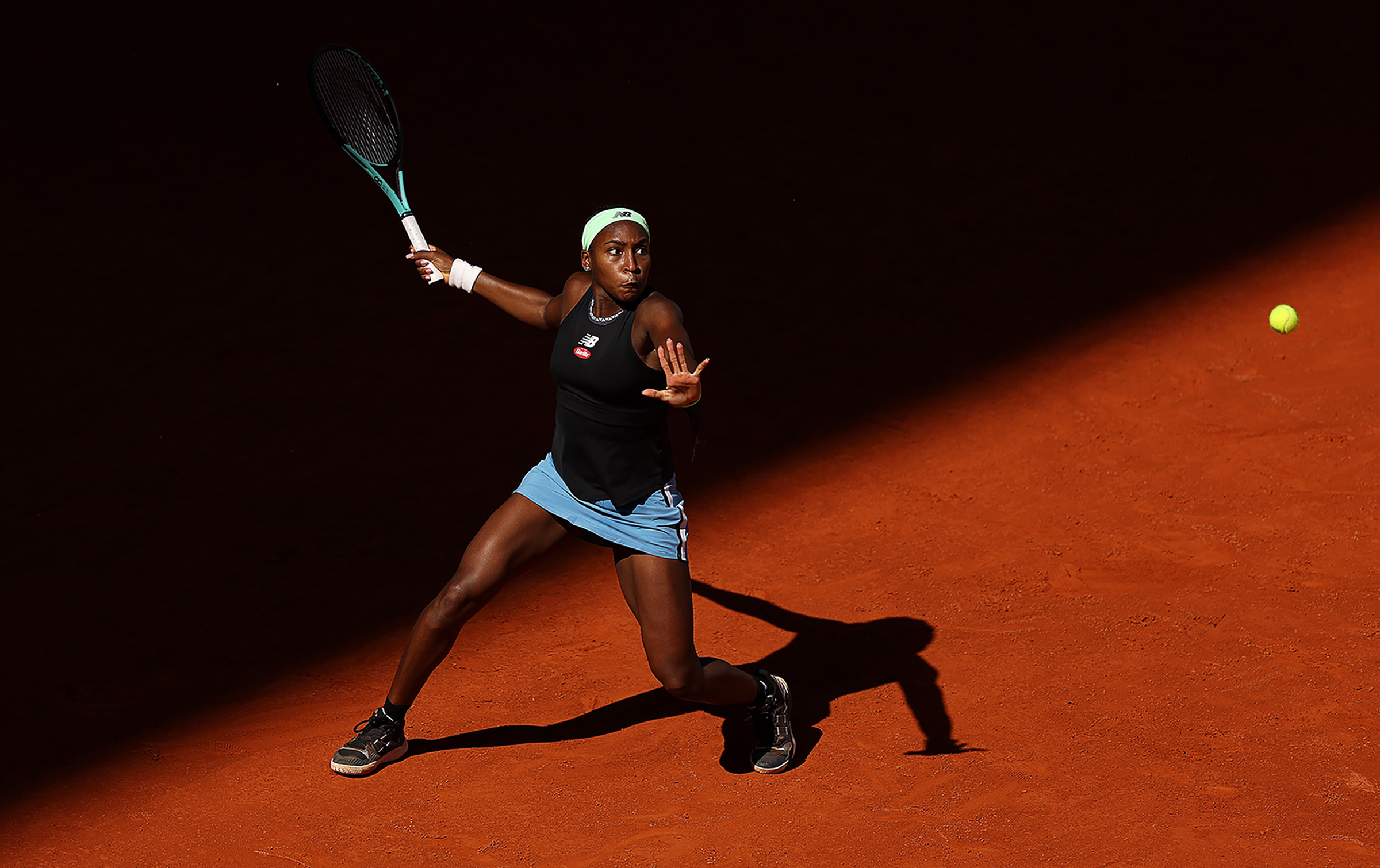
When she makes a mistake, Gauff will glance at her dad rather than at Gilbert. She’s more comfortable venting to him. “Sometimes he has to take a lot of bullets,” she says later. She says “sorry” a lot: three times in the first eight minutes of one session. She apologizes for serving the ball long into the gut of her hitting partner, or wide, or short. “That’s part of wanting to be perfect,” Gilbert says. “The only thing you ever got to be sorry about is if you didn’t give 100%. You give 100%, sometimes the result is sh-t.”
“It’s something I’m going to try to change,” Gauff says. “But I don’t do it during the match. That’s the important part.”
Her expression turns severe when she walks off the court for a rest during a subpar training block with Russia’s Daria Kasatkina. Her body language speaks volumes: Stay away. But near the end of practice, she chases down impossible balls and fires them back, displaying what her doubles partner, world No. 5 Jessica Pegula of the U.S., calls Gauff’s “superpower”—her incredible court coverage. At one point, Kasatkina lobs a shot over the net that Gauff, for a moment, loses in the sun. “I can’t see sh-t,” she says. But she spots it and smashes a winner, delighting hundreds of onlookers.
Then Cocomania ensues. As Gauff walks toward the players’ lounge, fans line up against a railing begging for autographs and selfies. An older gentleman asks her to sign his arm. “It’s for my wife!” he says. A quartet of women fix their hair, for their Instagrammable moment with the defending U.S. Open champ. “No pushing, please,” a security guard shouts at the aggressive adults. “We’ve got little kids up here.”
Gauff seems most at ease interacting with children. “I still feel very youthful,” she says. She watches SpongeBob SquarePants. She dressed up as Aisha—“the Fairy of Waves” from the animated series Winx Club—for Halloween. She says she’s tried to incorporate the respiratory methods of Tanjiro Kamado, the protagonist of the anime series Demon Slayer: Kimetsu no Yaiba, into her tennis. Tanjiro’s breathing techniques give him supernatural powers. “I’m not out here slaying demons,” says Gauff. “But it does help in the pressure moments.”
Gauff’s an avid reader. She packed Fourth Wing, a fantasy romance novel by Rebecca Yarros that went massively viral on TikTok, in her travel bag at Indian Wells. She also keeps up on current events as best she can. She objects, for example, to the book bans enacted in her home state of Florida and elsewhere. Gauff particularly objects to a YA novel she loves, The Hate U Give, appearing on banned lists: the story explores racial identity and police violence. Gauff’s message to Florida Governor Ron DeSantis, who supported measures that have led to an increase in restrictions: “Leave the books alone.”
She feels a sense of helplessness watching Israel’s military force in Gaza. “I don’t really support the mass violence going on to innocent people on both ends of the spectrum,” Gauff says. “And there’s one side that’s getting killed at more drastically faster rates than the other side.” She wants Hamas to release all Israeli hostages and wants to see a ceasefire, but she fears that neither side is hearing the other. “I feel like it’s becoming more, if you don’t support what’s happening in Gaza, it makes you feel like you’re antisemitic,” she says. “I feel far from that.”
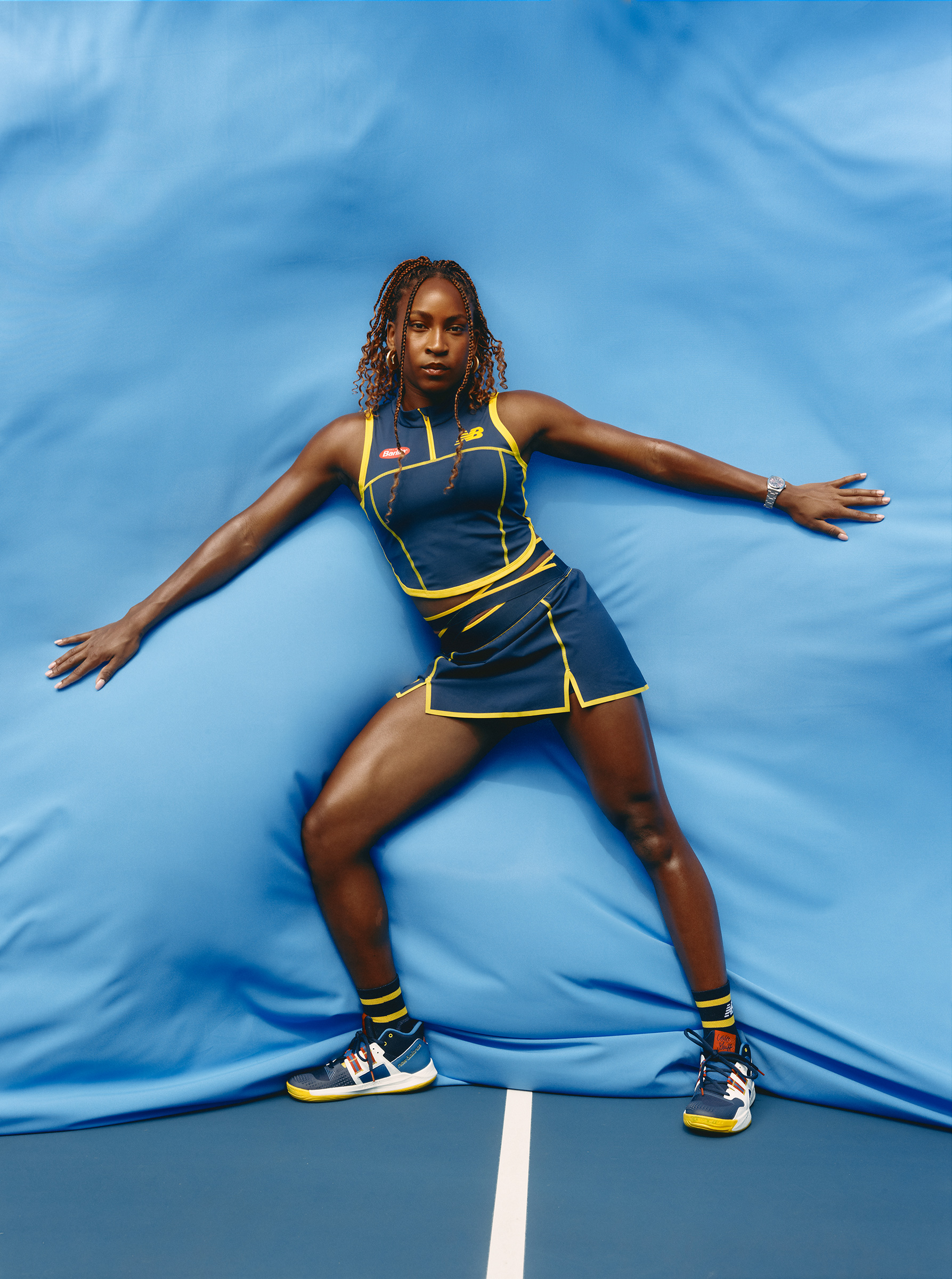
Gauff makes no apologies for expressing her views on one of the most fraught issues of our age. “I am not one to shy away from something that I feel informed about,” she says. “And I feel pretty informed about this topic.”
After reaching the semifinals of Indian Wells—the best showing there of her career—Gauff returns to Delray Beach in mid-March for a ceremony marking the refurbishment of the tennis courts at Pompey Park, a public facility where she trained with her dad growing up. After Gauff won the U.S. Open, the United States Tennis Association pledged to spend an amount equal to her tournament winnings, $3 million, resurfacing courts around the country, starting here. Before Gauff hits balls with kids from the Delray Beach Youth Tennis Foundation, all wearing her signature New Balance shoe—the coordinates of Pompey Park are inscribed on the left toe—some two dozen extended-family members gather around her for pictures. “Everybody look at the camera,” Gauff says, one of the youngest members of the group, but unquestionably in charge.
Gauff is transitioning to a new phase of her life. “At first I was scared to grow up,” she says. “But now I’m embracing adulthood and womanhood.” She still lives with her parents. Her mom still washes her clothes. But Gauff hopes to move out and find her own place. “I don’t have a timeline on that,” she admits. “I always say it’ll happen in my 20s at some point.” Despite also managing the extracurricular lives of Gauff’s brothers Codey, 16, a promising baseball prospect, and Cameron, 10, a multisport athlete, Candi insists either she or Corey will continue to travel with Gauff to tournaments until, in Candi’s words, “she’s a true adult.” “It has a lot to do with the age gap,” says Candi, pointing out that Coco is still 10 years younger than many players on tour. “It’s a lonely world.” Gauff has had a boyfriend for about a year, whose identity she prefers to keep private. She does share that he’s from Atlanta, and not famous. “This is my first real relationship,” says Gauff. “To just have someone to talk to who is not involved in tennis at all gives me a fresh perspective.” Candi was his fourth-grade teacher. “My mom always said, if they’re bad in school, they’re probably bad as adults,” says Candi. “He’s always been a smart, nice kid.” Meanwhile, Gauff, who’s currently ranked third in women’s singles, is still shooting for best-in-world status. “I get goosebumps representing my country,” says Gauff of her upcoming Olympic debut in Paris. “I want to win a gold so bad.” She’s backing off her childhood declarations about winning the most Grand Slams in history. “I was just 10 and delusional,” she says. “Serena made it look too easy.” Double-digit Slam victories, she says, feels like a more realistic goal.
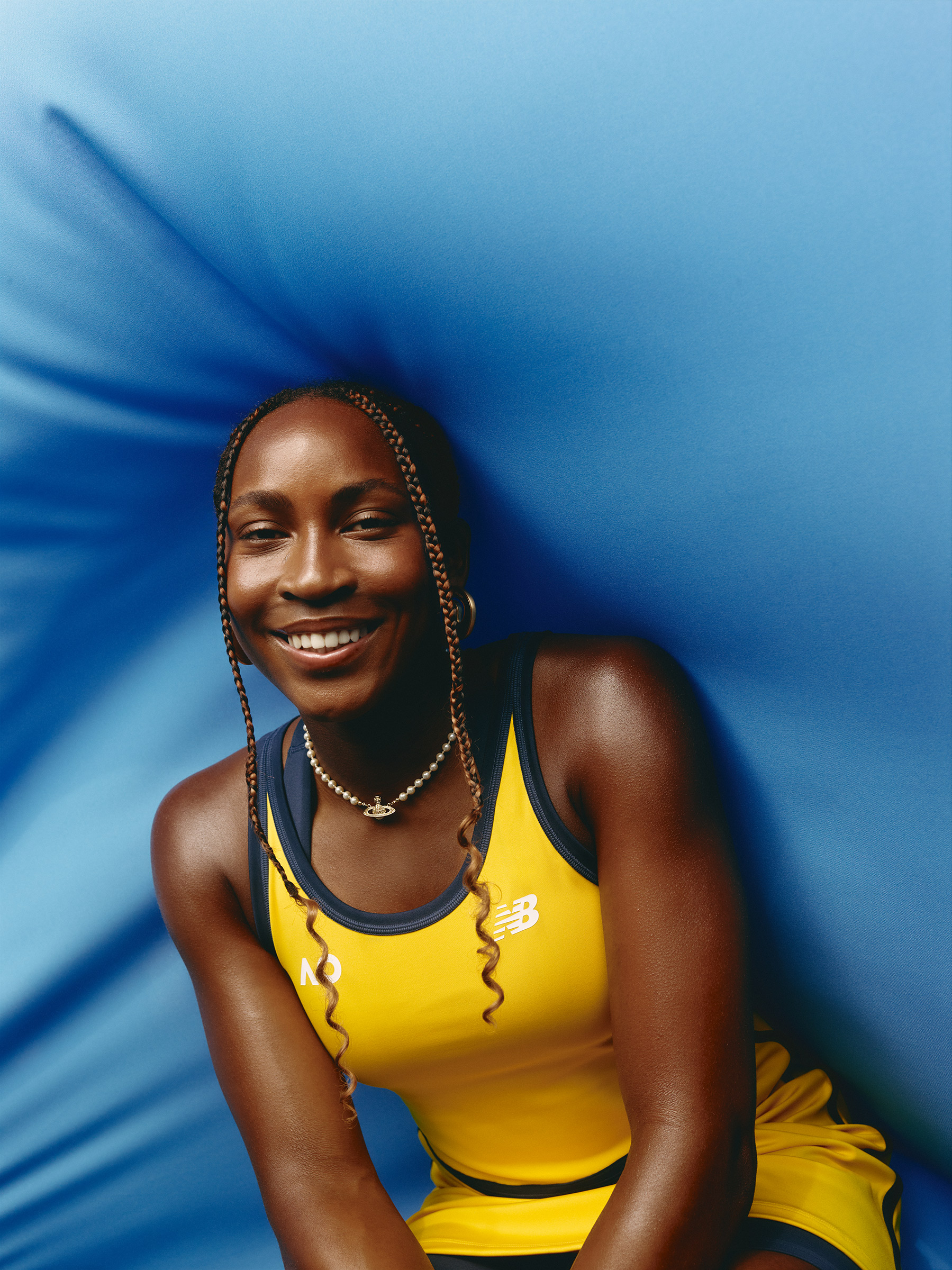
Sitting under an awning at Pompey Park, shaded from the late-afternoon sun, Gauff looks out at the gleaming new tennis courts. “My goal is to be relaxed and have fun and play with less pressure,” she says. “I know people are going to start talking about defending the U.S. Open title later on in the year. I’m not worried about that.” She can’t help hearing some noise, like when she fell short of expectations at two hard-court events in the Middle East in February, but her doubters continue to propel her. “All the hate comes,” she says. “People were like, ‘Oh, she’s burnt out, she’s this, she’s that.’ I’m like, ‘Oh my God.’” In her short time on this planet, Gauff has learned more than most about perspective. “If I could win every match, I would,” she says. “But I can’t. People don’t go to work and have a good day every day. We just have to all give each other grace.” —With reporting by Leslie Dickstein and Julia Zorthian
Set design by Henry King; styling by Gem Brookes; hair and make-up by Shella Martin; production by B&A Sydney
- Introducing the 2024 TIME100 Next
- The Reinvention of J.D. Vance
- How to Survive Election Season Without Losing Your Mind
- Welcome to the Golden Age of Scams
- Did the Pandemic Break Our Brains?
- The Many Lives of Jack Antonoff
- 33 True Crime Documentaries That Shaped the Genre
- Why Gut Health Issues Are More Common in Women